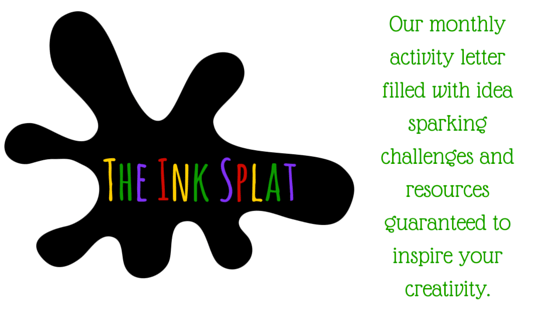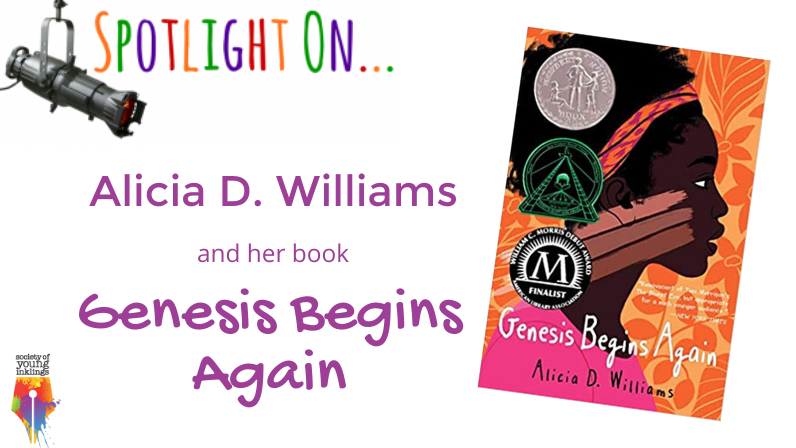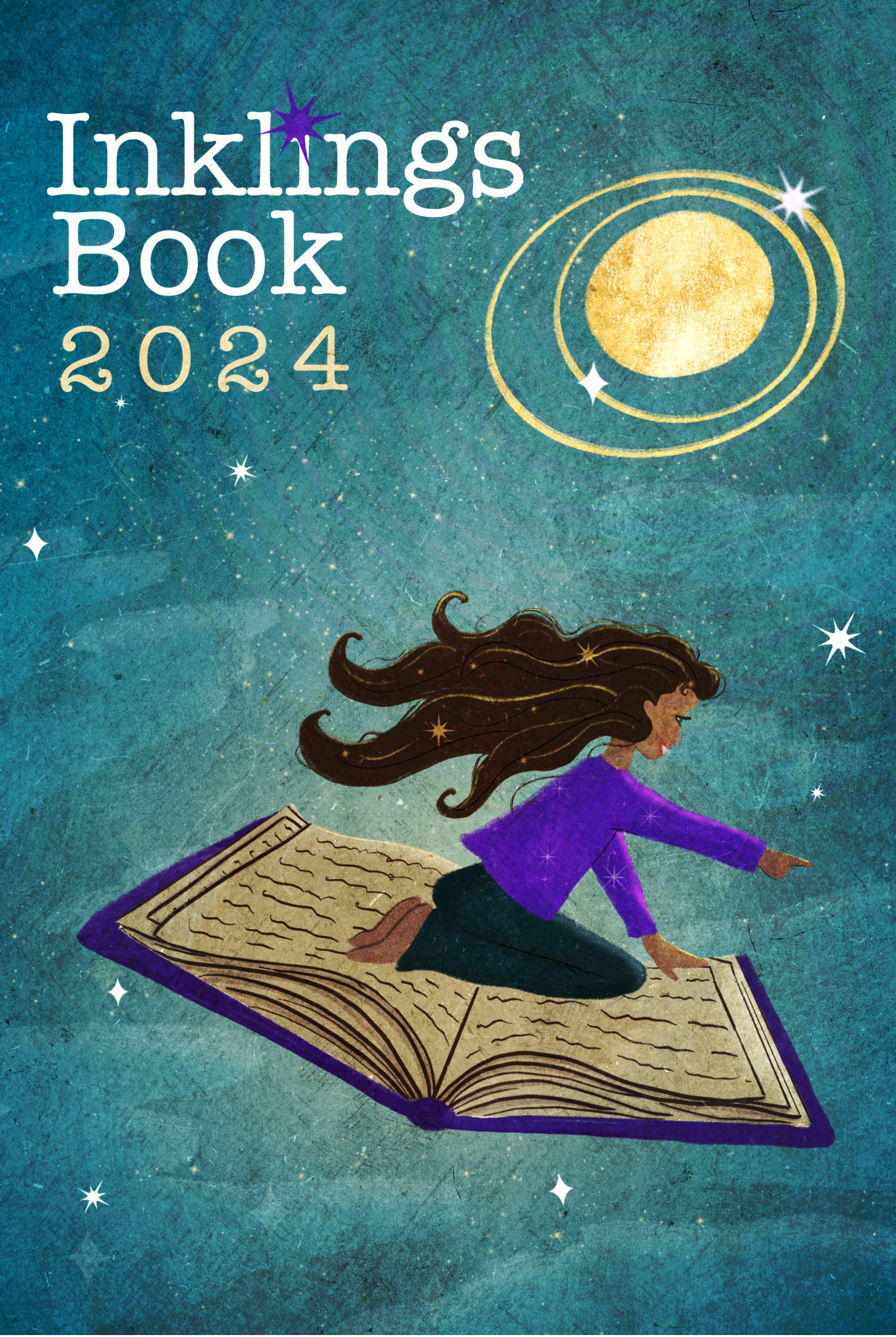This month, we talk to author Alicia D. Williams about her novel, Genesis Begins Again. She talks to us about the issues of racism and colorism.

Writing Challenge
This month, Alicia D. Williams has challenged us with a timed writing exercise.
Take one full minute to create a list of events that has happened to you–important, funny, scary, anything! Now, choose one item from that list to write about. Time yourself for three minutes–and don’t let your pencil/pen stop moving. Don’t forget to add details and descriptions. Go!
Aim for between 350 and 1000 words. Submit your response by emailing submit@younginklings.org. You might be published on our website!

An Interview with Alicia D. Williams
Genesis Begins Again is your debut novel. What didn’t you expect about writing and publishing a novel?
I didn’t expect people to read it. Okay, I know that sounds crazy. But seriously, I was told that I’m a MG debut and people don’t know me. My readers aren’t interactive online like YA readers. “Give it about a year or so, it’ll pick up steam.” It didn’t take a year. I’m six months in and let’s just say that I’m having a hard time managing my inbox, haha. Colby Sharp, teacher/bookvlogger/founder of NerdCamp tweeted and reviewed my book, and that definitely spread the word. My first interview was with Ari Shapiro of NPR–NPR!–and that’s when I felt that perhaps it won’t take a year and a half, maybe a year. NYT’s reviewed it and my email box got heavier. And kidlit advocates like Jonathan Schu booktalks Genesis at conferences. None of this was in my imagination or even my agent’s. I didn’t expect the story to resonate with readers in the way that it does, and I’m soooooo grateful.
You wrote Genesis Begins Again from the first-person perspective of Genesis, who thinks and speaks with slang. Why did you decide to use the first person? Did the stigma around “ghetto” speech affect your decision to let Genesis’s voice shine through her language?
Initially, I started Genesis in third-person point of view. It was terrible, or rather I was terrible at writing it. The flow didn’t feel natural. Even my graduate advisor urged me to try first-person, which I did. I’d read my writing aloud to feel the rhythm of not just the character’s voices, but the entire story. And it clicked.
You see, language is one of those things we judge people on. Country accents are looked at as less intelligent. Ebonics or use of the “be” is viewed as “ghetto” and “hood.” I agree, there is a stigma placed on how a person talks. Initially, I feared that the slang would feel stereotypical. Truth is, I wanted to connect with that underrepresented kid who doesn’t speak perfect or “proper” English because I didn’t. I still don’t (and am self-conscious that I still drop the endings of my words and sometimes use the wrong tense in a sentence). Secondly, I wanted people to realize that even though a person uses a different speech represented by their environment or cultural background, it doesn’t make the person bad, threatening, or less smart. I recently watched a documentary regarding African-American history and linguists agree that language holds a historical and cultural relevance, and saying slang is incorrect speech or bad English we’re telling whole communities that generationally they’re dumb. It might grate on some ears as we determine what is acceptable. Gullah, New Orleans, New Yorkers, all these different ways of speaking, blending language and slang–it’s who we are. Thirdly, I see my students walking across our predominantly white private school campus using slang terms like “lit,” “slay” and “Gucci.”That’s how we naturally operate, right? And there’s something to say as to who can use slang and still be viewed as “good” and those who are labeled bad and dumb because in the end, we all connect and adapt our language with different audiences.
And in the end, the slang may be criticized by some, but it honestly feels authentic to me. You’ll see Genesis adapting her language to fit in with the popular kids, whether it be slang or the use of words like “ridiculous” and “stinking (cute).”
In what ways do you see yourself in Genesis? In what ways are you different?
Genesis and I are both brown girls who experience colorism. Notice that I did not use past tense because discrimination against skin complexion within one’s own community is an existing issue. I’ve been told that I was too dark or would be cuter if I were light skin, just as Genesis.
We both love music. I love the old rhythm and blues, Beyonce, Rihanna–just music period. I used to sing in the mirror too, but not with a shirt on my head. And oh, Genesis can sing and I can’t. Secretly, I prayed and prayed to be able to sing well, still waiting.
Genesis Begins Again brings to light the issues of racism and colorism. What drove you to tell this story?
Originally the story was about a girl who was bullied because she was a heavy weight. Her dark skin and coily hair was an afterthought. During my revision years (2013-2015), the theme of beauty started taking over the story. And for Genesis, it was her dark skin and kinky hair. Her need to be beautiful was the heart of the story. Why, above weight, was color an issue? Perhaps it was the memories of my childhood that danced around in my head or what I witnessed within my community. Perhaps it was the pictures scrolling across my social media feed, the gripes I had within the dating community, or even in magazine advertisements. Or, perhaps it was feeling the strain of it as an adult, still being made to feel insecure about my brown skin. But once colorism rose to the forefront of this story, I couldn’t ignore it.
Also while working in kindergarten, every year we’d notice children of color, regardless of ethnicity, ashamed to use multicultural crayons that matched their skin tones. I’d see them shading in their self-portraits with the lightest touch, color barely showing. I’ve seen five-year-olds crying about their “big poofy hair.” As a writer I thought, What do I do with this information?”
If you could tell your younger writing self something, what would it be?
Little Alicia wasn’t a writer or dreamed of writing. So, I’d tell my younger self to write stories and keep the notebooks to pull out when you’re older. I’d remind little Alicia to use her imagination and never let it go. To record her thoughts and interesting facts–whatever, just keep writing. And, I’d tell her to write about the books she read and why she loved them. Those memories of childhood books, gosh, I wish I had them.

INKLINGS CONNECT
THE INKLINGS BOOKS ARE HERE!
Order your copies at your favorite local bookstore or grab them from Bookshop.org. We can't wait for you to read them!
A special thanks to Alicia D. Williams for sharing with us! You can find her book at her favorite book store, Park Road Books.

Alicia D. Williams is a teacher in Charlotte, NC. She is the proud mother of a brilliant college student. Her love for education stems from conducting school residencies as a Master Teaching Artist of arts-integration. Alicia D infuses her love for drama, movement, and storytelling to inspire students to write.

